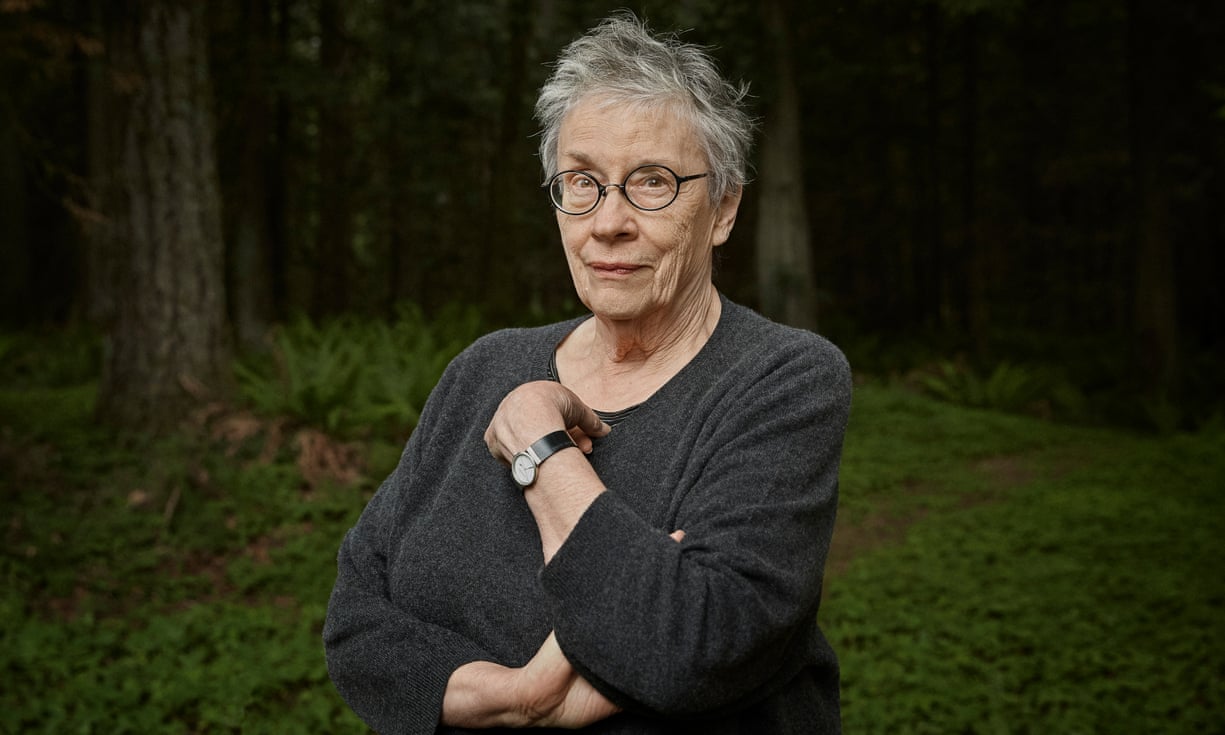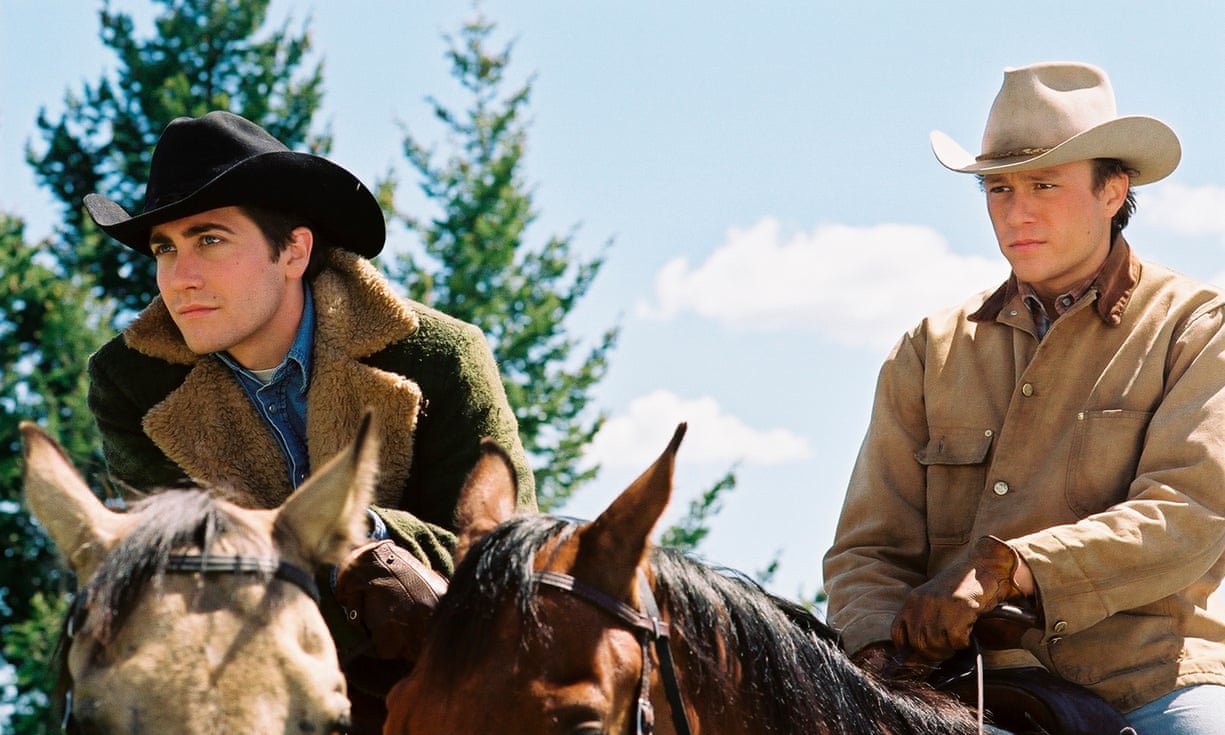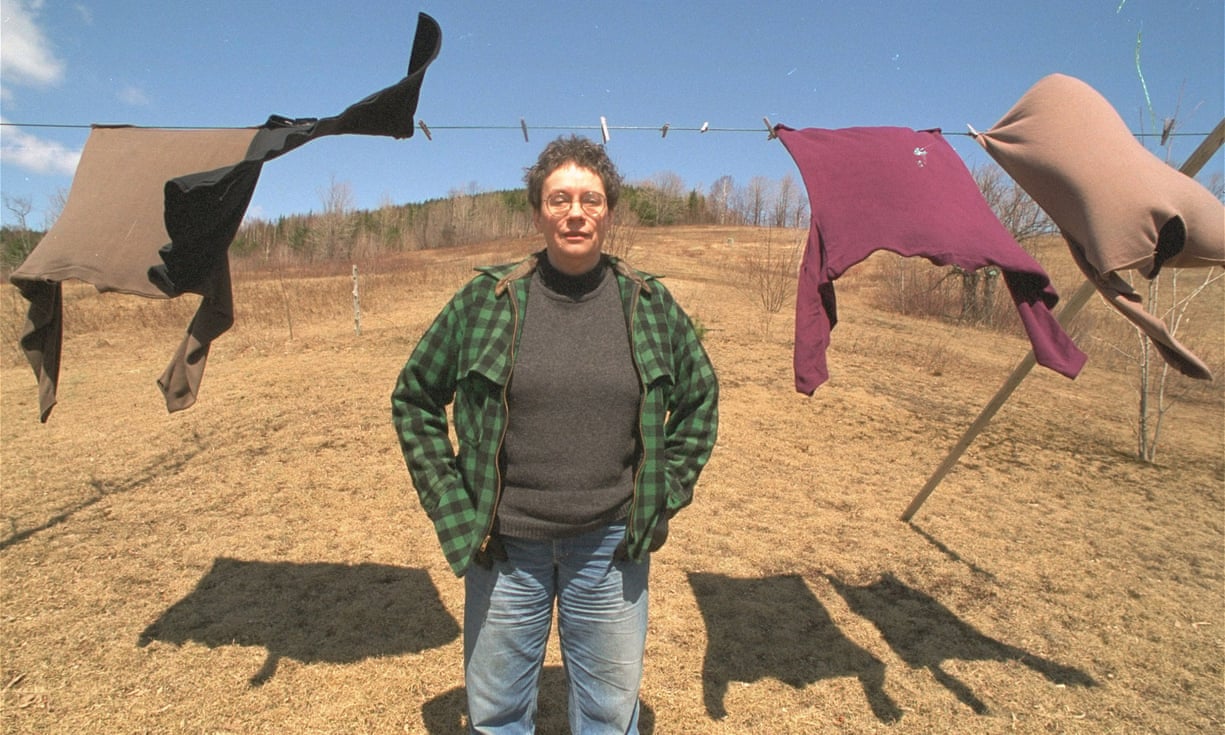Wow.
She later described herself to an interviewer in the early- 90s as “wild” at this time, her examples including: “throwing a knife at (and thank God missing) someone I thought I hated; driving north in the south-bound lane; hanging out with a wide variety of rough dudes in a wide variety of situations”.https://www.theguardian.com/books/2016/jun/05/annie-proulx-ive-had-a-life-i-see-how-slippery-things-can-be Annie Proulx: ‘I’ve had a life. I see how
Annie Proulx: ‘I’ve had a life. I see how
slippery things can be’At 80, Annie Proulx is as acute (and prickly) as ever.
As her latest book, Barkskins, is published, Lucy Rock
visits her woodland home to talk trees, Trump –
and why she’s bored with navel-gazing novelsBy Lucy Rock
Sunday 5 June 2016 07.00 EDT ‘While her skiing, hunting and canoeing days are behind her, she’s physically fit. Her mind still buzzes with story ideas.
‘While her skiing, hunting and canoeing days are behind her, she’s physically fit. Her mind still buzzes with story ideas.
Her look is unfussy and unchanged’: Annie Proulx at home in Washington. Photograph: Patrick Kehoe for the ObserverAnnie Proulx loves trees. For the past 10 years she has studied them, written about them and travelled the world looking at them. Recently she moved to a house set in a forest of lofty red cedars. It was here she discovered that not all trees love her.
“I’ve been sick since I’ve arrived,” she tells me as we settle into comfy grey sofas at her home 20 miles outside
Seattle, Washington. “Finally we figured out that, ironically, I’m really allergic to red cedar, which is all around me. It brings on asthma and other symptoms. It affects my whole immune system, so I have to pull up stakes and go somewhere else where it won’t follow me.”
The Pulitzer prize-winning author of
The Shipping News and
Brokeback Mountain has created an oasis here, amid her five acres of woodland. Shrubs and saplings have been planted in the gardens, encouraging unwelcome visits from nibbling deer and even a bear. The four-bedroom wooden house (yes, red cedar, she thinks) has been renovated inside using natural tones and materials – creamy walls, slate and wood for the floors. We sit in front of a stone fireplace flanked by well-stocked bookshelves and a coffee table where
A History of Men’s Fashion tops another pile of books. Picture windows frame views of the distant
Cascade Mountains. It’s cosy and serene.
But she plans to move to New England, where she and her four younger sisters lived as children, and one sister lives still. While she doesn’t relish the upheaval, she’s not wedded to Washington – especially not Seattle, the thriving tech city where she briefly lived.
“It’s just a place that is more irritating to me than anything else,” she says with a tiny shudder. “It’s one eternal traffic jam and everything seems mismanaged. I get tired of seeing people high-fiving each other. It’s full of techies; it’s just bursting with tech people. My own son is one, so I can’t complain.”
Proulx moved to Washington two years ago after selling her beloved
Bird Cloud, the house she built on 640 acres of wetlands, prairie and cliffs in
Wyoming. She wrote about the painstaking two-year process – it was completed in 2006 – in her eponymous memoir of the place. That home suited her love of the natural world and the rural and remote, the usual subjects of her writing. I ask why she decided to leave and she replies with a shot of sarcasm. “Because I sold it and the new owner didn’t particularly want me there as well.”
She pauses, then: “I don’t know. I’ve asked myself that a thousand times. There was a lot of driving, hours and hours of driving, to get decent groceries and get anything done, to see the dentist blah blah blah. I do miss it, every part of it.”
Married and divorced three times, Proulx lives alone; her youngest son,
Morgan, the techie, lives in Seattle and stays over most weeks. She will clearly miss his visits when she goes. By her own admission in Bird Cloud, Proulx is “bossy, impatient, reclusively shy, short-tempered and single-minded”.
She might be 80, but she’s far from ready to slip into retirement. While her skiing, hunting and canoeing days are behind her, she’s physically fit (apart from the tree allergy). Her mind still buzzes with story ideas. Her look is unfussy and unchanged: salt-and-pepper cropped hair, black-rimmed glasses, no jewellery, simple grey sweater and trousers. Her home is the same: tidy, tasteful and functional.
We meet to talk about her latest book,
Barkskins, a 700-page novel of high drama whose theme is deforestation. It starts with two Frenchmen in the late 17th century,
René Sel and
Charles Duquet, arriving in
New France (now the United States and Canada), where they work as woodcutters for a feudal lord. Sel marries a woman from the indigenous
Mi’kmaq people, while Duquet runs away and sets up a successful timber company. The book recounts the displacement and resettlement of multiple generations of each man, finishing in 2013. It charts their travels across North America, China, Europe and New Zealand and includes all manner of violent deaths. All this is set against the destruction of the world’s forests where they make their livings and which they believe to be infinite.
“It’s kind of an old-fashioned book,” Proulx says. “It’s long; it has a lot of characters; it takes a big theme. It isn’t a navel-staring, dysfunctional-family thing that’s so beloved of most American writers. It’s different, but I think people probably miss those books that were written some time ago – the big book that was written with care.”
 Riding high: Jake Gyllenhaal and Heath Ledger in Brokeback Mountain, Ang Lee’s 2005 film based on Proulx’s short story.
Riding high: Jake Gyllenhaal and Heath Ledger in Brokeback Mountain, Ang Lee’s 2005 film based on Proulx’s short story.
Photograph: Kimberly French/APIt has been a decade in the making, during which time she has read countless historical documents, diaries and rare books on forestry. “I was trained as a historian, so that’s what I love to do,” she says. (It isn’t all she’s been doing in her 70s: as well as writing Bird Cloud, she has also edited a book on the
Red Desert in Wyoming, published a collection of short stories and written the libretto for an operatic version of
Brokeback Mountain.)
“The deforestation is what
Barkskins is all about,” she says. “There are two epigraphs in the book. One of them is the key to the book, but nobody reads epigraphs, which is fine by me.”
I can’t remember them either. “Er, can you expand on that?” I ask.
“No.” Silence. I swallow.
“It’s on a page at the front where the epigraphs go…” She shrugs her shoulders, staring at my discomfort. I am transported back to the classroom.
I find the quote later. It’s taken from a 1967 essay written by the historian
Lynn Townsend White Jr in which he put forward the idea that Christianity was the root of the ecological crisis: “By destroying pagan animism, Christianity made it possible to exploit nature in a mood of indifference to the feelings of natural objects.”
Ask Proulx about something she’s not keen to talk about and there is a pause before she answers coolly and sparingly. I enquire about her children and she gives the briefest details. Her daughter,
Muffy, by her first husband (whom Proulx dropped out of college to marry when she was just 20), stayed with her father when they divorced after five years. Proulx married again in the 60s and had three sons –
Jonathan, Gillis and Morgan – before divorcing and marrying for a third time in 1969.
 Wild at heart: Proulx as a young woman camping in the woods near her home. Photograph: David Sillitoe for the Guardian.
Wild at heart: Proulx as a young woman camping in the woods near her home. Photograph: David Sillitoe for the Guardian.She once said that she grew up in an era when you were supposed to get married, adding: “I don’t think I was a particularly good or diligent mother. It took a long time for the obvious to become obvious: I could not operate in a conventional family.”
These days, Proulx says, she and her children enjoy regular get-togethers. “I get along with all my children rather well and they like each other, which makes me very happy. You want them to be friends as well as relatives.”
Find the right subject and Proulx is stimulating company: animated, occasionally passionate and wryly amusing. We talk about climate change. She tells me about an initiative to restore the number of monarch butterflies by urging gardeners to plant milkweed. Are people doing enough, I ask. “Some people are, but most people couldn’t care less about it. They would give you a blank stare if you mentioned that monarch butterflies need milkweed to complete their life cycle.”
I mention the
Paris climate change agreement signed by 177 countries last April. Too late, she thinks. “Some of the countries that are now in play in the world economy and culture don’t have an interest in those things. They are still happy to rip out their raw materials and natural resources for things like refrigerators and iPhones. They don’t seem to get that there isn’t any more.”
Her voice rises: “Nobody can visit the big trees again; the huge forests do not exist. The understorey has gone, and the smaller plants and animals – the ecosystem has been damaged. Change is right with us, and you can get frightened.” I ask if the thought of
Donald Trump, a denier of manmade climate change, in the White House frightens her. “I think the country has more or less brought this on themselves,” she says. “I don’t have personal feelings about it because that’s not who I am, but I am watching.”
 Winds of change: at home in Vershire, Vermont, back in 1994. Photograph: Toby Talbot/Associated Press
Winds of change: at home in Vershire, Vermont, back in 1994. Photograph: Toby Talbot/Associated PressProulx finds her strengths harder to list than her faults, but she thinks she’s a good observer. “I’m one of the ones at a party where you can always tell the writer because I’m leaning against the wall watching everybody else have fun.”
Her self-confessed shyness is easy to misinterpret it as crotchetiness. Look at her reaction to literary prizes. “I know that one should feel grateful and pleased and delighted, and jump up and down and scream, but I couldn’t do it.” As for women-only prizes, harrumph. “This has always bothered me, the division: as though there was something about women who write that is very different.”
For Proulx writing is all about “the making of the object. I look on it as a craftsman would making a table.” Her research is meticulous. She visited all the countries that feature in Barkskins. She’s a frequent, intrepid traveller, thanks to a pioneering spirit instilled as a child when her family moved many times – Vermont, North Carolina, Maine and Rhode Island – because of her French- Canadian father’s job with a textile company.
She ended up with an abundance of material and had to cut 150 pages from the first draft, a process she describes as “maddening. My editor,
Nan Graham, was absolutely wonderful, but I hated her deeply while we were doing this because she wanted to take out some of my favourite things. A lot of the deforestation material went.”
While much of the book is bleak, there are moments of dark humour. I mention finding an incident involving a wig amusing. She’s delighted. “Do you? Good, my editor wanted to cut that. You’re a Brit, that’s why.”
Proulx was a latecomer to the literary world, publishing her first novel,
Postcards, when she was 56. She had abandoned a PhD in the mid-70s to support her family by scraping an income as a freelance journalist, writing about everything from apples to mice and canoeing, and producing “how-to” books on cider making and DIY. During these years, with her third marriage disintegrating, she lived a back-to-the-land lifestyle with her boys, moving around several backwoods towns in Vermont where she fished, hunted and gardened. She later described herself to an interviewer in the early- 90s as “wild” at this time, her examples including: “throwing a knife at (and thank God missing) someone I thought I hated; driving north in the south-bound lane; hanging out with a wide variety of rough dudes in a wide variety of situations”.
In 1988 her first collection of stories was published and the novels that followed brought her instant acclaim. She has no regrets that success came late. “You have time to have a life, to see change, to understand a bit how people work, how the world works, how society works, how things shift around, how slippery things can be, everything from politics to personal relationships. It’s a great advantage to have that stuff under your belt when you start to write.”
Talking with Proulx is like reading one of her books: bracing yet rewarding. She speaks as she writes, and lives the same way: with measured efficiency and flashes of mischievous humour.
As our interview comes to an end, she picks up
A History of Men’s Fashion and flicks through the pictures. Chuckling at an artist in a garish shirt, she says: “I don’t remember his work, but who could forget that haircut?” I ask if she’s interested in fashion. “Only for the sake of characters. I like them to have the clothes they might have worn.”
Then it’s back to the trees. She gamely agrees to pose for photographs amid the red cedars. The photographer had set up his equipment before he knew of her allergy and she won’t hear of him moving it. “It takes a day or so before they affect me. The bear could get me first,” she jokes as we walk outside, before adding wistfully: “I love the way they look. It’s too bad they make me miserable.”
Barkskins by Annie Proulx is published by Fourth Estate at £18.99. To order a copy for £15.19, go to bookshop.theguardian.com